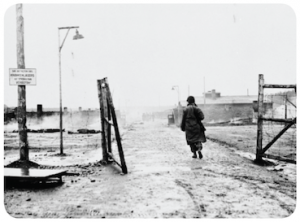Publication: One-to-One, Spring 2014
How much freedom do we have? One measure of freedom is the ability to choose. The more choices, the more freedom. When choices are narrowed, freedom is lost. We do not fully appreciate our freedom until we begin to sense that our ability to choose is being lost.
Why is it that we desire the right to make our own choices? Why do little children keep asking “why” when they are told to do something? Is it because the desire to make our own choices is part of the human nature? I think so. I believe that God created us in His own image and that means we have a will. Granted, His will and His ways are infinitely higher than ours, but, we do have a will. It should be apparent that the Lord desires our service to be voluntary—a matter of choice and not coercion. The choice to love or not cannot be coerced, but will have consequence.
Consequence
Choices have consequences. We can all look back and see that our past choices have put us where we are. The choice of believing God or not, the choice of marriage or not, the choice of friends or not, or the choice of a vocation all have consequences, good or bad. Even the seemingly small daily choices determine our next step.
We all have made some bad choices, usually without considering consequences. When we finally discover the consequences, we are faced with another choice: whose fault is it?
A desire to freely make our choices is not the only inborn desire; we are also born with the tendency to blame others for the consequence and that is as old as Eden. “The woman you gave me,” Adam responded when God confronted him with his sinful choice. It was “God’s fault” for giving him Eve or it was “Eve’s fault” for tempting him. Eve quickly pointed to the serpent, “The devil made me do it.”
Modern responses to our consequences follow the Adamic pattern. “God made me this way,” “It was my parents,” “My friends turned on me,” “My boss in unfair,” and more. All of the above may have elements of truth, but our response was our choice.

Dr. Viktor Frankl was a Holocaust survivor. He was imprisoned and lost his freedom but he famously said, “Everything can be taken from a man but one thing; the last of the human freedoms—to choose one’s attitude in any given set of circumstances, to choose one’s way.” Attitude is a choice that cannot be taken away, perhaps the final choice that determines our path.
Blaming others or circumstance maybe inborn in Adam’s race but it is still a choice that sets our feet on the wrong path.
Responsibility
Blame is another way of saying, “I am not responsible.” The moment we say that, we remove the possibility of a course correction. The only way to change course is to choose to accept responsibility. Adam and Eve did not “get off the hook,” nor do we; eventually sin finds us out (see numbers 32:23). Bad choices follow us.
David sinned grievously in the relationship with Bathsheba. When he was confronted by Nathan the prophet, he took responsibility (see Second Samuel 12). The tax collector took responsibility for his sin (see Luke 18:9-14). Isaiah took responsibility for his sin (see Isaiah 6:5). Taking responsibility for our condition is the beginning of repentance and justification before God. It is the necessary decision that enables God to count us righteous and make us righteous. Taking responsibility does not remove all of our circumstance but it does begin a new and superior path.
Let me be clear about my own convictions; I do believe that God is Sovereign and knows us before we are formed (see Psalm 139:13-16; Jeremiah 1:5). I believe that God, based on His infinite wisdom, makes His own choices. Yet I also believe that we are born with the ability to choose His will or our own. That choice determines our destiny and before God we are responsible.
Joshua
Joshua stood before Israel in the latter days of his life and said, “Choose for yourself this day whom you will serve…as for me and my house we will serve the Lord” (see Joshua 24:15). Israel was chosen by God to be His special instrument, to reveal His ways to the world. But Israel still had the choice to serve Him or not. They often made the wrong choice and suffered the consequence.
I find it interesting that Joshua not only made his choice but he led his family in their choice. Our choices affect others. Israel served the Lord all the days of Joshua, and the elders who outlived Joshua (see Joshua 24:31). But the successive generation made a different choice and did what they thought right in their own eyes (see Judges 21:25). What was right in their own eyes brought defeat.
We are blessed in our nation to choose our leaders. What our leaders do and their choices affect all of us in a profound way. Leaders reflect our choices and will either give us more choices or less choices. God is the author of freedom, but the enemy of our souls will narrow choices to the point where our ability to choose is lessened. Then we must once again choose our attitude and the price of liberty. That price has often been blood.
Joshua was not passive; he was courageously standing for God’s choice (see Joshua 1). When the courage to take a stand is lost, the privilege to choose is lost. The human desire for freedom is greatly depressed or snuffed out.
Personal
I wish that I had always made the right choice of attitude and direction but unfortunately, I have not. That is my own fault. But there are three choices that have profoundly affected my life.
In my teens I was faced with the choice of trusting Jesus as my Savior or going my own way. I had al ready “joined the church” but simply did so because it seemed right. After all, I was the pastor’s son and grew up in church. But finally, I was confronted with my hypocrisy, sin, and need to be delivered from myself. I am eternally grateful that I chose to follow Jesus that day. I made many wrong choices after that, but I had made a lifelong, eternal commitment. The Lord has held me to it.
ready “joined the church” but simply did so because it seemed right. After all, I was the pastor’s son and grew up in church. But finally, I was confronted with my hypocrisy, sin, and need to be delivered from myself. I am eternally grateful that I chose to follow Jesus that day. I made many wrong choices after that, but I had made a lifelong, eternal commitment. The Lord has held me to it.
A few years later, I had to make another choice: what would I do with my life? That was a very serious decision again because of the lifelong impact that it would have. After two years, I chose to give in to what I believed was God’s will. I became a minister in spite of all of my personal preferences and problems.
A third choice was whom I would marry. I gave up on dating for two years, not because I was virtuous, but because I was scared of wrong choices. Then God in His grace led me to a young woman who was goodness personified. We had 50 years of love together. She provided so much that I needed.
These three choices were all made by the time I was 21 years old and never in my own wisdom (see Ecclesiastes 12:1). My only wise choice was to trust the Lord. I highly recommend that choice, especially to young people. I should also say this: my parents spent a lot of time on their knees!
The Redeemer
I am eternally grateful that Jesus is able to redeem our bad choices. That is not a license to choose wrongly, but it is our hope when we have done so. I rejoice that the Lord is able to make all things work together for good to those who love Him and are called according to His purpose (see Romans 8:28). He is able to even turn our failure in a test into a testimony of redemption. He is also able to use negative situations for His purpose if we choose the right attitude. As Frankl said, that may be our last freedom in a given circumstance.
One of the best examples of God using negative circumstance to produce positive results is Joseph, son of Jacob. He was mistreated by his jealous brothers, sold into slavery, falsely accused, imprisoned, and forgotten.
But his character and gift of interpreting dreams eventually brought him to be prime minister of Egypt. In that capacity, he saved both Egypt and his brothers from starvation. When he finally confronted his brothers, he said, “You meant evil against me; but God meant it for good” (see Genesis 50:20).
God used it all for Joseph’s good, Egypt’s good, and his brothers’ good. That is redemption! Nothing comes close to saying redemption as does the Cross of Jesus. He was sinless, yet died as a sinner. He was falsely accused, rejected, and tortured. Yet His death brought us life. In the Garden of Gethsemane, He made a choice: “not my will, but Thine be done.” Of course, that choice was the Father’s choice made before time (see Revelation 13:8). I believe that the Father has a choice for each of us, but it remains for us to choose His choice. The consequences of that choice, good or bad, are eternal.
Looking Ahead
In the days ahead, we will face many choices, and our choices will matter to us and others. The Good news is that God has a choice, and if we choose His choice, the past can be redeemed. We can chose His Kingdom over ours, His way over ours, His thoughts and attitudes over ours and His destiny for us over our own plans.
Before we make our choices, here are some things to consider:
• Have I trusted Him, His Word and His guidance?
• Have I sought His attitude toward my situation?
• Do I believe that His plan is superior to my own?
• Have I considered the consequences of my choice?
• Am I willing to take responsibility for my past errors or will I give in to the temptation to blame?
No one can answer these questions for us but if we answer them correctly, then we can see many blessings in days ahead! It is a matter of choice, and choices matter.
Scripture Reference: Numbers 32:23 2 Samuel 12, Luke 18:9-14,Isaiah 6:5, Psalm139:13-16, Jeremiah 1:5 Joshua 24:15,31, Judges 21,25, Joshua 1,Ecclesiastes 12:1, Romans 8:28, Genesis 50:20, Revelation 13:8
STEPHEN SIMPSON is the Editor of One-to-One Magazine and the Director of CSM Publishing. In addition to publishing ministry, Stephen has served in leadership for churches and ministries in Costa Rica, Florida, Mississippi, Texas, and Michigan, as well as being the Senior Pastor of Covenant Church of Mobile (2004-2013). He continues to travel in ministry across North America and in other nations.